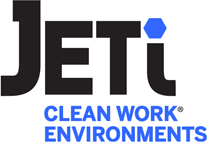What significant regulatory issues are producers facing in EU, NA, and beyond?
Food safety is one of the greatest issues facing manufacturers today. Others include workplace cleanliness and worker safety. In particular, governments everywhere are passing new rules and regulations to help protect the public from injury caused by poor food processing and food handling practices. At JETI, we can help companies in food and pharmaceutical industries, as well as automotive, mining, and other industries meet and exceed required hygienic and cleanliness standards in their production processes.
